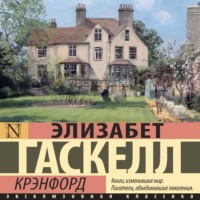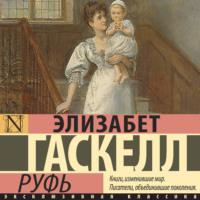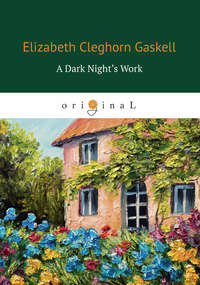 полная версия
полная версияThe Grey Woman and other Tales
If our Detective Police had only been in existence!
This last is hardly a story of unaccounted-for disappearance. It is only unaccounted for in one generation. But disappearances never to be accounted for on any supposition are not uncommon, among the traditions of the last century. I have heard (and I think I have read it in one of the earlier numbers of Chambers's Journal), of a marriage which took place in Lincolnshire about the year 1750. It was not then de rigueur that the happy couple should set out on a wedding journey; but instead, they and their friends had a merry jovial dinner at the house of either bride or groom; and in this instance the whole party adjourned to the bridegroom's residence, and dispersed, some to ramble in the garden, some to rest in the house until the dinner-hour. The bridegroom, it is to be supposed, was with his bride, when he was suddenly summoned away by a domestic, who said that a stranger wished to speak to him; and henceforward he was never seen more. The same tradition hangs about an old deserted Welsh Hall standing in a wood near Festiniog; there, too, the bridegroom was sent for to give audience to a stranger on his wedding-day, and disappeared from the face of the earth from that time; but there, they tell in addition, that the bride lived long, – that she passed her three-score years and ten, but that daily during all those years, while there was light of sun or moon to lighten the earth, she sat watching, – watching at one particular window which commanded a view of the approach to the house. Her whole faculties, her whole mental powers, became absorbed in that weary watching; long before she died, she was childish, and only conscious of one wish – to sit in that long high window, and watch the road, along which he might come. She was as faithful as Evangeline, if pensive and inglorious.
That these two similar stories of disappearance on a wedding-day "obtained," as the French say, shows us that anything which adds to our facility of communication, and organization of means, adds to our security of life. Only let a bridegroom try to disappear from an untamed Katherine of a bride, and he will soon be brought home, like a recreant coward, overtaken by the electric telegraph, and clutched back to his fate by a detective policeman.
Two more stories of disappearance, and I have done. I will give you the last in date first, because it is the most melancholy; and we will wind up cheerfully (after a fashion). Some time between 1820 and 1830, there lived in North Shields a respectable old woman, and her son, who was trying to struggle into sufficient knowledge of medicine, to go out as ship-surgeon in a Baltic vessel, and perhaps in this manner to earn money enough to spend a session in Edinburgh. He was furthered in all his plans by the late benevolent Dr. G – , of that town. I believe the usual premium was not required in his case; the young man did many useful errands and offices which a finer young gentleman would have considered beneath him; and he resided with his mother in one of the alleys (or "chares,") which lead down from the main street of North Shields to the river. Dr. G – had been with a patient all night, and left her very early on a winter's morning to return home to bed; but first he stepped down to his apprentice's home, and bade him get up, and follow him to his own house, where some medicine was to be mixed, and then taken to the lady. Accordingly the poor lad came, prepared the dose, and set off with it some time between five and six on a winter's morning. He was never seen again. Dr. G – waited, thinking he was at his mother's house; she waited, considering that he had gone to his day's work. And meanwhile, as people remembered afterwards, the small vessel bound to Edinburgh sailed out of port. The mother expected him back her whole life long; but some years afterwards occurred the discoveries of the Hare and Burke horrors, and people seemed to gain a dark glimpse at his fate; but I never heard that it was fully ascertained, or indeed more than surmised. I ought to add that all who knew him spoke emphatically as to his steadiness of purpose, and conduct, so as to render it improbable in the highest degree that he had run off to sea, or suddenly changed his plan of life in any way.
My last story is one of a disappearance which was accounted for after many years. There is a considerable street in Manchester leading from the centre of the town to some of the suburbs. This street is called at one part Garratt, and afterwards, where it emerges into gentility and, comparatively, country, Brook Street. It derives its former name from an old black-and-white hall of the time of Richard the Third, or thereabouts, to judge from the style of building; they have closed in what is left of the old hall now; but a few years since this old house was visible from the main road; it stood low on some vacant ground, and appeared to be half in ruins. I believe it was occupied by several poor families who rented tenements in the tumble-down dwelling. But formerly it was Gerard Hall, (what a difference between Gerard and Garratt!) and was surrounded by a park with a clear brook running through it, with pleasant fish-ponds, (the name of these was preserved until very lately, on a street near,) orchards, dovecotes, and similar appurtenances to the manor-houses of former days. I am almost sure that the family to whom it belonged were Mosleys, probably a branch of the tree of the lord of the Manor of Manchester. Any topographical work of the last century relating to their district would give the name of the last proprietor of the old stock, and it is to him that my story refers.
Many years ago there lived in Manchester two old maiden ladies, of high respectability. All their lives had been spent in the town, and they were fond of relating the changes which had taken place within their recollection, which extended back to seventy or eighty years from the present time. They knew much of its traditionary history from their father, as well; who, with his father before him, had been respectable attorneys in Manchester, during the greater part of the last century: they were, also, agents for several of the county families, who, driven from their old possessions by the enlargement of the town, found some compensation in the increased value of any land which they might choose to sell. Consequently the Messrs. S – , father and son, were conveyancers in good repute, and acquainted with several secret pieces of family history, one of which related to Garratt Hall.
The owner of this estate, some time in the first half of the last century, married young; he and his wife had several children, and lived together in a quiet state of happiness for many years. At last, business of some kind took the husband up to London; a week's journey in those days. He wrote and announced his arrival; I do not think he ever wrote again. He seemed to be swallowed up in the abyss of the metropolis, for no friend (and the lady had many and powerful friends) could ever ascertain for her what had become of him; the prevalent idea was that he had been attacked by some of the street-robbers who prowled about in those days, that he had resisted, and had been murdered. His wife gradually gave up all hopes of seeing him again, and devoted herself to the care of her children; and so they went on, tranquilly enough, until the heir came of age, when certain deeds were necessary before he could legally take possession of the property. These deeds Mr. S – (the family lawyer) stated had been given up by him into the missing gentleman's keeping just before the last mysterious journey to London, with which I think they were in some way concerned. It was possible that they were still in existence; some one in London might have them in possession, and be either conscious or unconscious of their importance. At any rate, Mr. S – 's advice to his client was that he should put an advertisement in the London papers, worded so skilfully that any one who might hold the important documents should understand to what it referred, and no one else. This was accordingly done; and although repeated at intervals for some time, it met with no success. But at last a mysterious answer was sent; to the effect that the deeds were in existence, and should be given up; but only on certain conditions, and to the heir himself. The young man, in consequence, went up to London, and adjourned, according to directions, to an old house in Barbican, where he was told by a man, apparently awaiting him, that he must submit to be blindfolded, and must follow his guidance. He was taken through several long passages before he left the house; at the termination of one of these he was put into a sedan-chair, and carried about for an hour or more; he always reported that there were many turnings, and that he imagined he was set down finally not very far from his starting point.
When his eyes were unbandaged, he was in a decent sitting-room, with tokens of family occupation lying about. A middle-aged gentleman entered, and told him that, until a certain time had elapsed (which should be indicated to him in a particular way, but of which the length was not then named), he must swear to secrecy as to the means by which he obtained possession of the deeds. This oath was taken; and then the gentleman, not without some emotion, acknowledged himself to be the missing father of the heir. It seems that he had fallen in love with a damsel, a friend of the person with whom he lodged. To this young woman he had represented himself as unmarried; she listened willingly to his wooing, and her father, who was a shopkeeper in the City, was not averse to the match, as the Lancashire squire had a goodly presence, and many similar qualities, which the shopkeeper thought might be acceptable to his customers. The bargain was struck; the descendant of a knightly race married the only daughter of the City shopkeeper, and became a junior partner in the business. He told his son that he had never repented the step he had taken; that his lowly-born wife was sweet, docile, and affectionate; that his family by her was large; and that he and they were thriving and happy. He inquired after his first (or rather, I should say, his true) wife with friendly affection; approved of what she had done with regard to his estate, and the education of his children; but said that he considered he was dead to her, as she was to him. When he really died he promised that a particular message, the nature of which he specified, should be sent to his son at Garrett; until then they would not hear more of each other; for it was of no use attempting to trace him under his incognito, even if the oath did not render such an attempt forbidden. I dare say the youth had no great desire to trace out the father, who had been one in name only. He returned to Lancashire; took possession of the property at Manchester; and many years elapsed before he received the mysterious intimation of his father's real death. After that, he named the particulars connected with the recovery of the title-deeds to Mr. S., and one or two intimate friends. When the family became extinct, or removed from Garratt, it became no longer any very closely kept secret, and I was told the tale of the disappearance by Miss S., the aged daughter of the family agent.
Once more, let me say I am thankful I live in the days of the Detective Police; if I am murdered, or commit bigamy, at any rate my friends will have the comfort of knowing all about it.
A correspondent has favoured us with the sequel of the disappearance of the pupil of Dr. G., who vanished from North Shields, in charge of certain potions he was entrusted with, very early one morning, to convey to a patient: – "Dr. G.'s son married my sister, and the young man who disappeared was a pupil in the house. When he went out with the medicine, he was hardly dressed, having merely thrown on some clothes; and he went in slippers – which incidents induced the belief that he was made away with. After some months his family put on mourning; and the G.'s (very timid people) were so sure that he was murdered, that they wrote verses to his memory, and became sadly worn by terror. But, after a long time (I fancy, but am not sure, about a year and a half), came a letter from the young man, who was doing well in America. His explanation was, that a vessel was lying at the wharf about to sail in the morning, and the youth, who had long meditated evasion, thought it a good opportunity, and stepped on board, after leaving the medicine at the proper door. I spent some weeks at Dr. G.'s after the occurrence; and very doleful we used to be about it. But the next time I went they were, naturally, very angry with the inconsiderate young man."
1
Wir pflügen und wir streuenDen Saamen auf das Land;Das Wachsen und GedeihenSteht in des höchsten Hand.Er sendet Thau und Regen,Und Sonn und Mondeschein;Von Ihm kommt aller Segen,Von unserm Gott allein:Alle gute Gabe kommt herVon Gott dem Herrn,Drum dankt und hofft auf Ihn.








